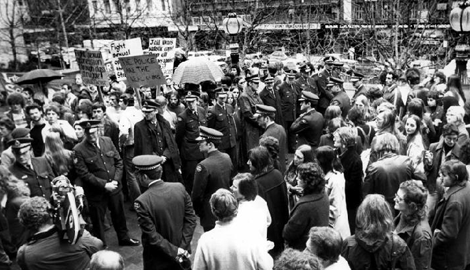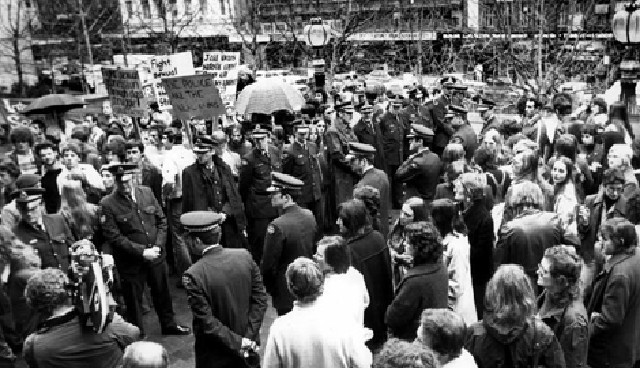Fifty-eight years ago, as a conscript in the Australian Navy, I was on parade with ship’s company on the wharf at Williamstown, I believe it was.

Since this 1978 rally, which was a pre-curser to the Mardi Gras, we have come a long way
A police identity check was taking place. Two rather hefty men, wearing dark fedoras, so favoured by celebrated criminals and successful detectives of the day, and bearing police standard issue suspicious scowls, moved between our ranks.
A third, slighter and very nervous, man was in tow. The offence being investigated was the bashing and robbery by sailors of a homosexual man in a park, the third person with the two detectives.
The exercise was abortive. It always was I was told. In such cases homosexuals really had no rights in practice, regardless of what the law might have said more generally.
Defence counsel would unmercifully shred their character in the witness box and with that would demolish any crushed remnant of self-respect to which the witness might attempt to cling.
The witness’s credibility as a complainant would be zilch by this time. Police, courts and the general public had little sympathy for homosexuals. No, it was an oppressive period which, by its prevailing bullying intolerance of non-conforming minorities about whom it was uneasy, made bashing and rolling gays for their wallets a reasonably safe and lucrative pastime.
Only the brave and foolhardy among victims would complain in such conditions. Nothing came of this incident I relate.
Later, as a young plain clothes officer attached to Brisbane City C.I.B., I heard of the unedifying visit of a Detective Sergeant and his mate, uninvited and certainly unannounced, to a party at Spring Hill organised by members of the local homosexual community.
The police officers were in high spirits following pre-shift lubrication at a popular rubbidy. The door rocketed open with their entry, one fired a few shots in the air to heighten the partying atmospherics and, not surprisingly, the party-goers were off in all directions at what was announced as a police raid, some of them dressed in rather exotic gear for males.
As the story was told, it was quite a fun thing, but in fairness to the general run of detectives, they severely frowned upon this excessive display of machismo behaviour 1950’s style.
These rather gloomy memories, and others like them, so long forgotten, resurfaced after I read a newspaper report recently of how Alan Turing, a British citizen and a brilliant mathematician, famous for his work on breaking the ‘unbreakable’ German Enigma codes during World War II, was being rehabilitated as a convicted homosexual.
His sentence, shortly after the war, had been the choice of gaol or chemical castration. He chose the latter and within two years suicided. A lofty reward from a grateful community for a man whom P.M. Brown of Britain said, “ … without his outstanding contribution, the history of World War Two could well have been very different.”
Where the issue of homosexuality has been concerned, so much outstanding human talent, even genius, has been wantonly sacrificed over so much time on the grotty altar of personal prejudice and community ignorance and petulance.
We have now had more than a couple of decades’ experience of living with legally sanctioned homosexual practices. The sky has not splintered apart, and our community has not degenerated into a Sodom and Gomorrah, as had been gloomily predicted earlier by fervid opponents of homosexual rights.
In fact, we have generally found gays to be good neighbours and friends, helpful and respected workmates, people whose presence is most frequently welcome as desirable fellow citizens.
Life heaps enough unavoidable suffering and pain on humans without our social bettors having added to, as in the past, or our political masters, as now, adding to that burden of heartache by imposing cruel and unjustifiable punishments on members of a stigmatized minority; think of poor Alan Turing!
Some will say, well, thank goodness we live in more enlightened, tolerant times now where gays are concerned; right? Well, partly true but gays do not stand on all fours, equal with the rest of us.
The times are nowhere near as tolerant of and respectful towards those people as would be the case if the community accepted them as fully equal with us, the dominating majority, the heteros. We allow them a sort of provisional, limited citizenship; freedom on a short leash, as it were.
Yes, homosexual love is now tolerated by the law, but not marriage. There is a ‘relationship certificate’ available for them in Victoria, Tasmania and the ACT, the short end of the leash, Civil Partnerships.
These offer some protections but do not pass muster as real equality for gays which requires the provision of marriage rights. If an Australian same sex couple go, say, to Canada they can get a marriage certificate which is universally recognised and understood as symbolising the solemn commitment between two people.
The Labor Party had the chance to do something meaningful on this at its last national conference but squibbed it. Has it lost the belly fire for the big challenges of major progressive reform and the enshrinement of basic liberties for which I have so long admired it?
It is not as if Labor is uncaring. In 2008 it did remove discrimination against same sex couples in some 85 laws, so I am advised. But it is the big one, full recognition of gay people’s marriage rights, which will really establish the depth of its commitment to the principal of people’s entitlement to be different, but still fully valued law-abiding members of our society.
Federal anti-discrimination laws need to be covered by an overriding provision prohibiting discrimination on the basis of sexual orientation and gender identity. This area can be a tricky course to negotiate as things now stand.
An example from when I was Foreign Minister in the 1980s. A prominent citizen contacted me. A family member had undertaken surgical conversion from male to female according to established, responsible procedures.
A departmental officer had ruled, according to set guidelines, that the person’s passport would record that person’s sex as male and the officer was obdurate about that. The person concerned and family were distraught.
I changed that departmental practice immediately in spite of the officer’s sulky disapproval of my instructions. I instructed my advice was to be the new practice. Apparently the new guidance did not last long. But that has since been remedied, I am informed, and thank goodness.
I met the young woman concerned a few years ago. She and her husband were happily married. But the moral of this case is these sorts of decisions cannot be left to the whims of wooden ministers or narrow bureaucrats. Without protection from discrimination in Federal law, gay people currently have limited avenues available to challenge such discriminatory decisions when receiving the services of Commonwealth departments.
There are some hopeful signs of change in important places. That very conservative institution, the Roman Catholic Church, recently ruled that the much excoriated gay, Oscar Wilde, was a “lucid analyst of the modern world”. But do not hope for too much too soon. The wheels of progress grind exceedingly slow indeed in that institution.
On the other hand gay hate crimes, bashings and murders, still occur, reportedly as recently as last weekend, in Centennial Park.
Many of these issues have been discussed during the recent national Human Rights Consultation. My hope is that this soon to be released report recognises there is a lot more work to be done before we can feel confident that gay people are treated decently and with equality as our respected peers.
Publication: The Punch
Author: Bill Hayden
Publication: 6 October 2013
To see original article, click here.

